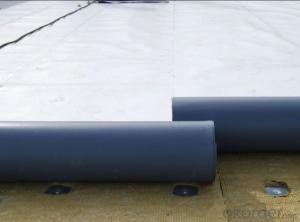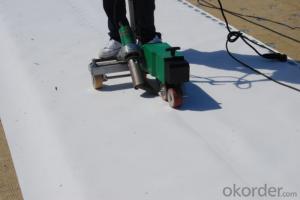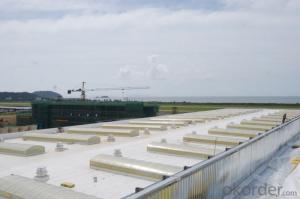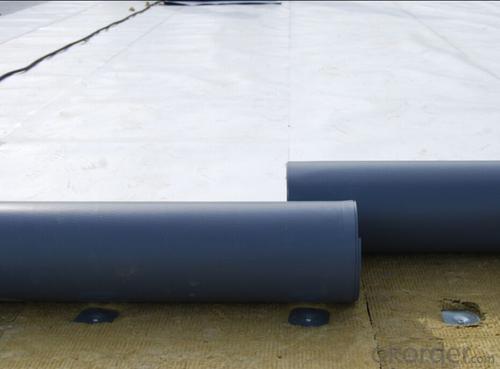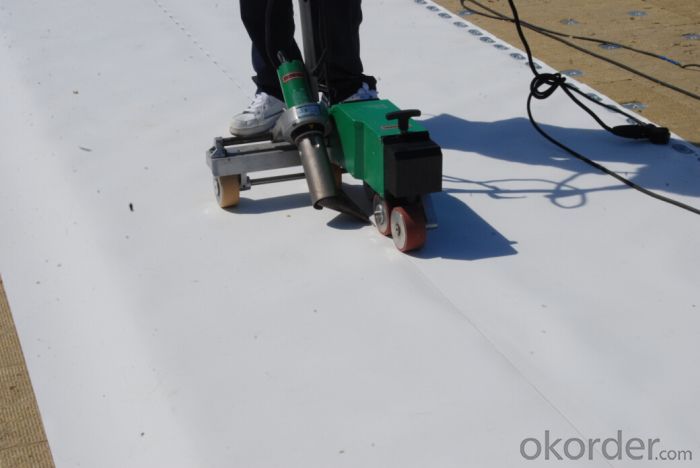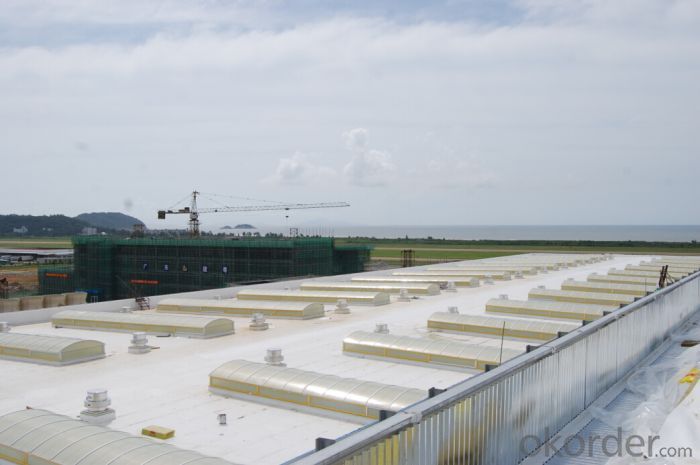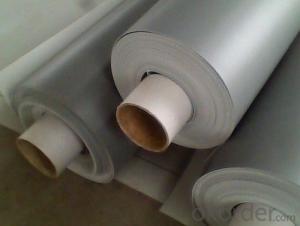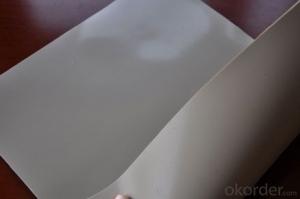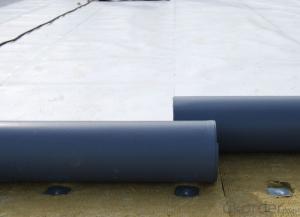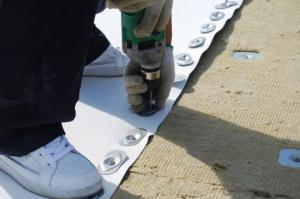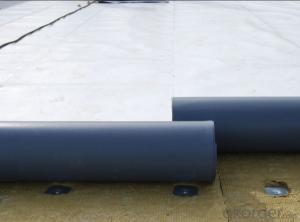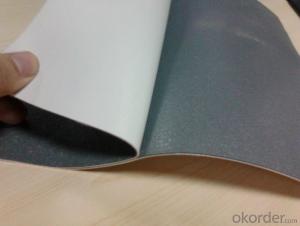TPO Waterproof Roofing Membrane Thickness with 1.8 mm
- Loading Port:
- Qingdao
- Payment Terms:
- TT OR LC
- Min Order Qty:
- 5000 m²
- Supply Capability:
- 10000 m²/month
OKorder Service Pledge
OKorder Financial Service
You Might Also Like
Description Of TPO membrane:
TPO (Thermoplastic Polyolefin) waterproof membrane is typically based on polypropylene and EP (ethylene-propylene) rubber. TPO mainly contains carbon atoms and hydrogen atoms and doesn’t contain any plasticizers and chlorine elements. It is a beautiful, long-lived eco-friendly product. TPO membranes are installed mechanically-attached, fully-adhered or ballasted.
Specification of TPO membrane:
1) Size: 2.05m (width)*20m (length) or customized
2) Thickness: 1.2mm, 1.5mm, 2.0mm
3) Type: Homogeneous; Reinforced with Polyester felt; Fabric backing
4) Color: white/grey or customized
5) Note: exposed type
Product Advantages of TPO membrane:
1. Weather resistance and durability; Excellent weld ability;
2. No any crisp agents to prevent materials brittleness;
3. Intermediate enhanced polyester mesh fabric to have high tensile strength, fatigue resistance and penetrating resistance suitable for mechanically attached roofing systems;
4. Excellent the same high and low temperature resistance as rubber materials which can keep flexible at -50° C and keep mechanical strength in high temperature;
Applications of TPO membrane:
1. Roof construction & steel structure of both industrial and civil engineering
2. Underground engineering, such as subways, tunnels, air Raid shelter, etc.
3. Sewage treatment, dam, reservoir and basement, grain storehouse, etc.
FAQ:
Q: Can I visit your company?
A: Yes, welcome to visit our enterprise.
Q: Can I do the third party testing before loading?
A: Yes, we could accept the third party testing.
Q: Which kind of payment in your company?
A: We could accept TT, LC at sight, etc.
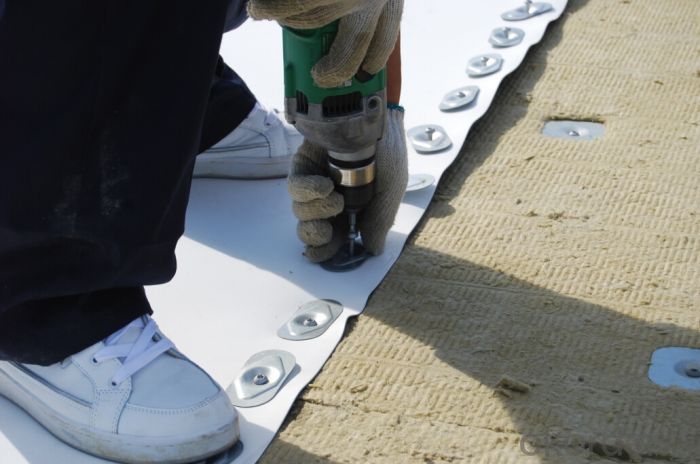
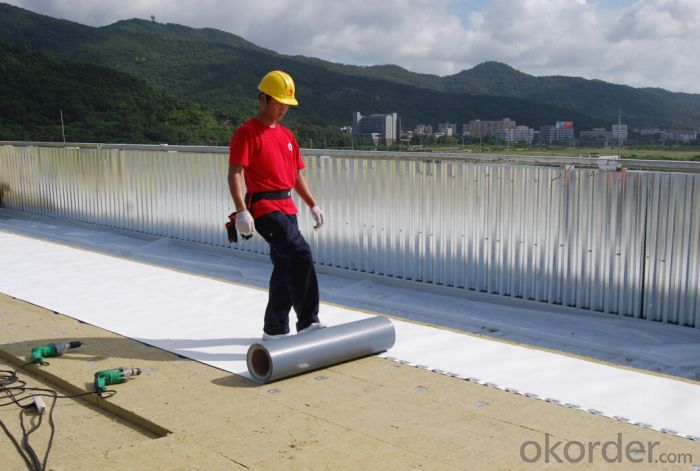
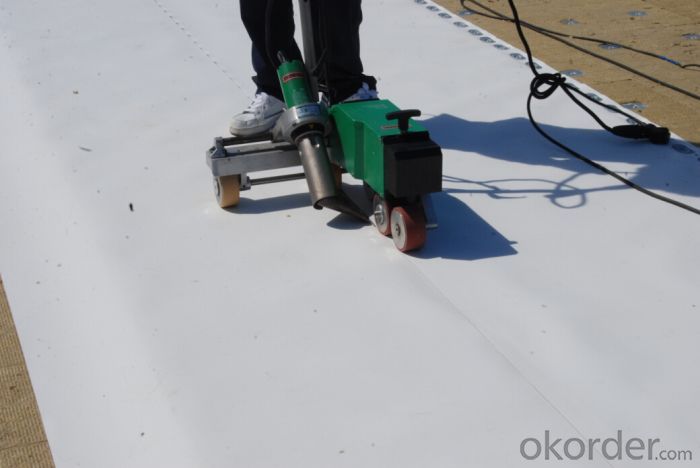
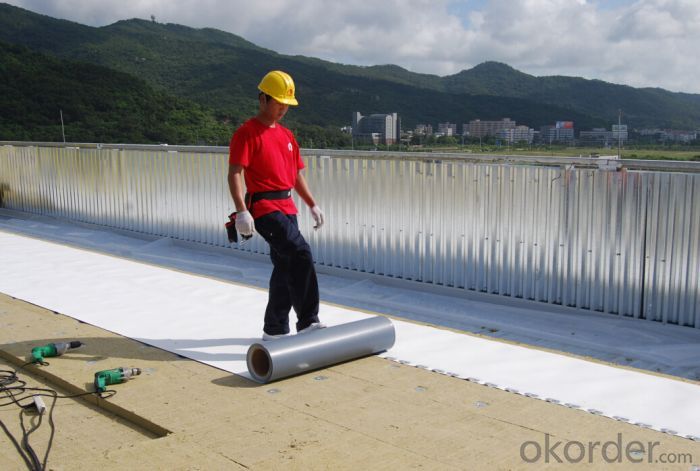
- Q: Can a waterproofing membrane be applied on curved surfaces?
- Yes, a waterproofing membrane can be applied on curved surfaces. In fact, waterproofing membranes are designed to be flexible and adaptable, making them suitable for application on various shapes and contours, including curved surfaces. These membranes are typically made from materials such as modified bitumen, polyurethane, or rubber, which have excellent elongation and flexibility properties. They can be easily molded and stretched to conform to curved surfaces without compromising their waterproofing capabilities. This allows for effective waterproofing of structures with curved components like roofs, balconies, tunnels, and tanks. Proper installation techniques and specialized tools may be required to ensure proper adherence and complete coverage on curved surfaces, but with the right expertise and materials, waterproofing membranes can be successfully applied on curved surfaces.
- Q: Can a waterproofing membrane be used in conjunction with insulation materials?
- Yes, a waterproofing membrane can be used in conjunction with insulation materials. In fact, it is often recommended to use both together in order to provide a comprehensive solution for protecting buildings from moisture and enhancing energy efficiency. The waterproofing membrane acts as a barrier to prevent water infiltration, while insulation materials help to regulate temperature and reduce heat loss or gain. By combining these two components, the building envelope can be effectively protected from water damage and insulated to maintain a comfortable indoor environment. It is important to ensure that the waterproofing membrane is properly installed and compatible with the insulation materials to achieve optimal performance and longevity.
- Q: Can a waterproofing membrane be used for loading docks or ramps?
- Yes, a waterproofing membrane can be used for loading docks or ramps. A waterproofing membrane is designed to protect surfaces from water damage by creating a barrier that prevents water from seeping through. Loading docks and ramps are exposed to various weather conditions and can be prone to water infiltration, which can cause damage over time. Applying a waterproofing membrane to these surfaces can help to prevent water penetration, protecting the structure and increasing its lifespan. Additionally, a waterproofing membrane can also provide added benefits such as slip resistance, protecting against chemical spills, and reducing maintenance costs.
- Q: Can waterproofing membranes be used on metal roofs?
- Indeed, it is possible to utilize waterproofing membranes on metal roofs. When it comes to safeguarding and sealing roofs, including metal ones, waterproofing membranes are frequently favored. These membranes are specifically engineered to serve as a barrier against water infiltration, thereby safeguarding the roof's structure and preventing any potential leaks. They can be directly applied to the metal roof surface, creating an impervious seal that is resistant to moisture, UV rays, and other environmental elements. By implementing waterproofing membranes, the lifespan of metal roofs can be considerably prolonged, as they effectively prevent rust and corrosion, while also boosting energy efficiency by minimizing heat transfer. Consequently, applying waterproofing membranes on metal roofs represents a practical and successful approach to ensure both durability and longevity.
- Q: Can a waterproofing membrane be used on tunnels with communication systems?
- Yes, a waterproofing membrane can be used on tunnels with communication systems. In fact, it is highly recommended to protect sensitive communication equipment and wiring from water damage. A waterproofing membrane is designed to create a barrier against water infiltration, preventing leaks and seepage. By applying a waterproofing membrane to the tunnel walls and floors, the communication systems can be safeguarded from potential water-related issues, such as corrosion, short circuits, and signal disruption. It is important to choose a waterproofing system that is compatible with the specific needs and requirements of the communication systems in the tunnel to ensure optimal protection and functionality.
- Q: Can waterproofing membranes be used on balconies?
- Yes, waterproofing membranes can be used on balconies. Waterproofing membranes are specifically designed to provide a protective barrier against water penetration, making them an ideal solution for balconies that are exposed to weather elements such as rain, snow, and moisture. These membranes are typically applied to the surface of the balcony to create a seamless, watertight seal, preventing water from seeping through and causing damage to the underlying structure. The use of waterproofing membranes on balconies helps to extend their lifespan, reduce maintenance costs, and ensure the overall durability and functionality of the balcony.
- Q: Can a waterproofing membrane be used on galvanized surfaces?
- Yes, a waterproofing membrane can be used on galvanized surfaces. The membrane provides an additional layer of protection against water penetration, which is especially important for galvanized surfaces that may be prone to rusting or corrosion.
- Q: Can a waterproofing membrane be used in areas with high groundwater levels?
- Yes, a waterproofing membrane can be used in areas with high groundwater levels. In fact, it is highly recommended to use a waterproofing membrane in such areas to protect the structure from water infiltration. A waterproofing membrane is specifically designed to create a barrier against water, preventing it from seeping into the building or structure. This can be particularly important in areas with high groundwater levels, as the pressure from the water can be significant and increase the risk of water damage or flooding. By installing a waterproofing membrane, you can effectively mitigate the risk of water infiltration and ensure the longevity and durability of the structure.
- Q: Are waterproofing membranes resistant to efflorescence?
- Yes, waterproofing membranes are typically resistant to efflorescence. Efflorescence is the crystalline deposit of salts that can occur on the surface of materials like concrete or masonry when moisture migrates through them. Since waterproofing membranes create a barrier against moisture, they prevent the migration of water and consequently minimize the occurrence of efflorescence.
- Q: Can a waterproofing membrane be used for water treatment plants?
- Yes, a waterproofing membrane can be used for water treatment plants. It can provide an effective barrier to prevent water leakage and protect the structure from moisture damage. Additionally, waterproofing membranes can help maintain the quality and integrity of the treated water by preventing contamination from external sources.
Send your message to us
TPO Waterproof Roofing Membrane Thickness with 1.8 mm
- Loading Port:
- Qingdao
- Payment Terms:
- TT OR LC
- Min Order Qty:
- 5000 m²
- Supply Capability:
- 10000 m²/month
OKorder Service Pledge
OKorder Financial Service
Similar products
Hot products
Hot Searches
Related keywords
